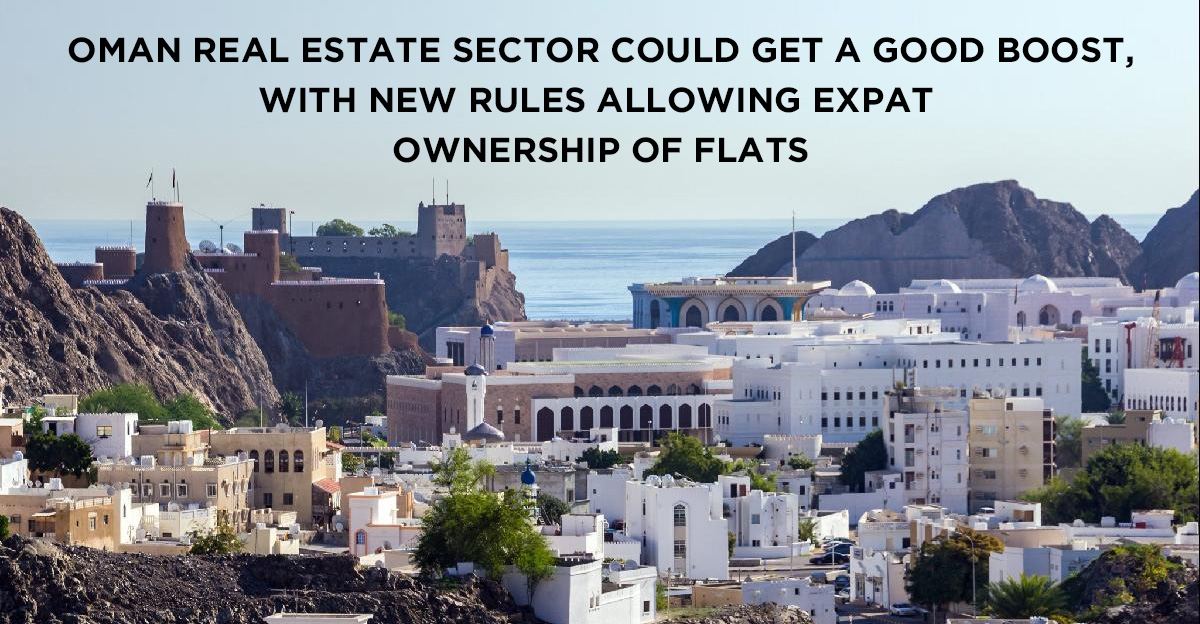Oman real estate sector could get a good boost, with new rules allowing expat ownership of flats
Property prices in the Oman real estate sector have consistently witnessed a year-over-year decline of 10–15 percent since 2016(1). This downturn coincides with a steady decline in expatriate population, owing to growing protectionism and “Omanisation”. Seeing the correlation, and taking stock of supply glut, Oman’s Ministry of Housing and Urban Planning (MHUP) has taken a monumental decision to allow expat ownership of flats. The new rules, issued under Usufruct Rights, could give the distressed sector a much needed boost and a new lease of life, with implications extending beyond real estate, onto the economy at large.
New rules for expat ownership of flats
The new regulations allow expats to purchase flats priced at OMR 45,000 or higher, with the minimum price to be reviewed from time to time, based on market response. Other criteria and characteristics(2) of the scheme include:
- Buyer should be aged 23 or above
- Property should be in a multi-storey building with more than four floors
- Property should have no less than two bedrooms
- Only the Buyer or first-degree relatives are allowed to stay
- Property can be used as collateral in financial transactions
- Property cannot be sold or leased off in the first four years of ownership
- Rights are transferable to legal heirs
These terms and conditions have been strategically devised, with a long-term vision of bolstering the real estate sector and raising capital for larger economic diversification initiatives. However, the initiative is likely to have several short term benefits as well. Experts believe that the newly-launched scheme could pump liquidity into Oman’s economy, which has recently borne the brunt of volatility in fossil fuel markets. These positives are perhaps the reason for the strategic registration fee structure, which requires sellers to pay three percent of property value, while buyers pay a corresponding five percent.
In addition, the new scheme is likely to induce a diversification in offerings being made available in the Oman property market, which has often been perceived as less attractive than other, more prominent, GCC real estate investment destinations, in the past. As reopening and post-pandemic recovery gathers momentum, developers could tailor their value propositions around community-based projects, with more bedrooms and value-added services. In addition, the rules associated with the new regulation could stimulate the sales of existing inventories, which are unoccupied. The stipulated age of the buildings, in which expats can make their purchase, must not exceed four years from the date of issuing the building completion certificate. Placing this limitation bodes well for buildings that have been completed since 2016 – many of which remain largely unoccupied, due to the imposition of a visa ban on foreign workers.
Long-term vision and economic outlook
Previously, expats in Oman could own real estate only under special circumstances or in designated Integrated Tourism Complexes (ITCs). However, such properties where lacking the perception of a secure investment, especially due to the absence of the right of inheritance. Now, with ownership rights under Usufruct, which carries an initial term of up to 50 years, along with provision for extension up to 99 years, Oman real estate is poised for a watershed moment, in line with the Sultanate’s long-term developmental vision.
This vision is further exemplified by the decision to limit expat-owned units in buildings to 40 percent and expats of single nationality to 20 percent, as part of promoting diversity while preserving the national identity. While the scheme is limited to Muscat Governorate for now, the Ministry is contemplating more locations based on the response the offer receives, within the expatriate community. If supplemented with freehold ownerships and property visa programs, the service economy and the Oman Tourism Vision 2040, too, could stand to benefit. In fact, Oman welcomed more than 3.5 million tourists in 2019(3), up 8.14 percent from the previous year. This rise in interest indicates a competitive tourism industry, which could be rebuilt to greater new heights, as international travel resumes in the new normal.
While the service industry is expected to grapple with challenges resulting from the COVID-19 crisis, for the foreseeable future, these new ownership rules could add considerable momentum to Oman’s post-pandemic economic revival. The rationale is rather simple: Expatriates account for almost 90 percent of all workers in Oman’s private sector, and property prices are currently at historic lows. These parameters represent the possibility for a classic case of a ‘win-win’ proposition, which will benefit this sizable population of expats, as well as the Sultanate’s wider economy.




